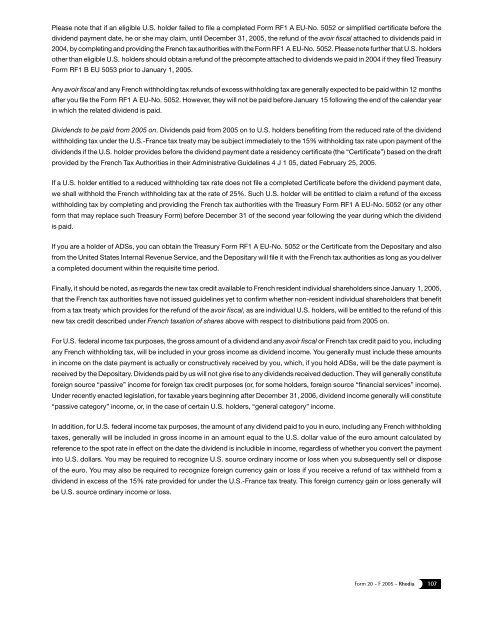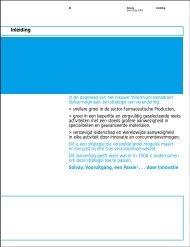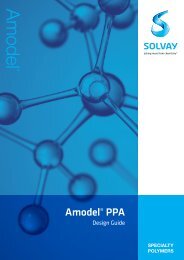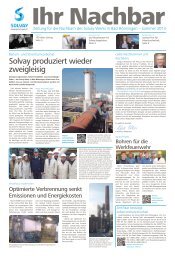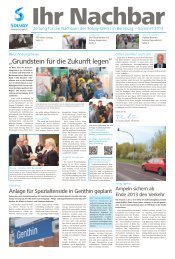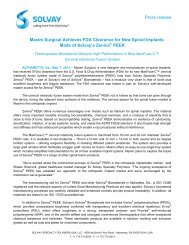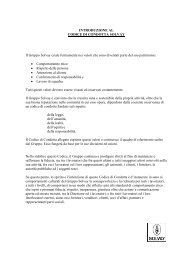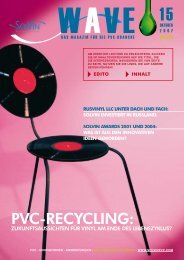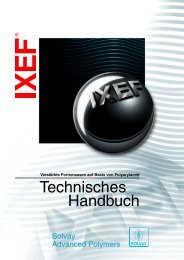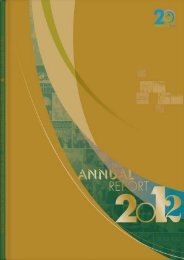Form 20-F 2005
Form 20-F 2005
Form 20-F 2005
You also want an ePaper? Increase the reach of your titles
YUMPU automatically turns print PDFs into web optimized ePapers that Google loves.
Please note that if an eligible U.S. holder failed to file a completed <strong>Form</strong> RF1 A EU-No. 5052 or simplified certificate before the<br />
dividend payment date, he or she may claim, until December 31, <strong>20</strong>05, the refund of the avoir fiscal attached to dividends paid in<br />
<strong>20</strong>04, by completing and providing the French tax authorities with the <strong>Form</strong> RF1 A EU-No. 5052. Please note further that U.S. holders<br />
other than eligible U.S. holders should obtain a refund of the précompte attached to dividends we paid in <strong>20</strong>04 if they filed Treasury<br />
<strong>Form</strong> RF1 B EU 5053 prior to January 1, <strong>20</strong>05.<br />
Any avoir fiscal and any French withholding tax refunds of excess withholding tax are generally expected to be paid within 12 months<br />
after you file the <strong>Form</strong> RF1 A EU-No. 5052. However, they will not be paid before January 15 following the end of the calendar year<br />
in which the related dividend is paid.<br />
Dividends to be paid from <strong>20</strong>05 on. Dividends paid from <strong>20</strong>05 on to U.S. holders benefiting from the reduced rate of the dividend<br />
withholding tax under the U.S.-France tax treaty may be subject immediately to the 15% withholding tax rate upon payment of the<br />
dividends if the U.S. holder provides before the dividend payment date a residency certificate (the “Certificate”) based on the draft<br />
provided by the French Tax Authorities in their Administrative Guidelines 4 J 1 05, dated February 25, <strong>20</strong>05.<br />
If a U.S. holder entitled to a reduced withholding tax rate does not file a completed Certificate before the dividend payment date,<br />
we shall withhold the French withholding tax at the rate of 25%. Such U.S. holder will be entitled to claim a refund of the excess<br />
withholding tax by completing and providing the French tax authorities with the Treasury <strong>Form</strong> RF1 A EU-No. 5052 (or any other<br />
form that may replace such Treasury <strong>Form</strong>) before December 31 of the second year following the year during which the dividend<br />
is paid.<br />
If you are a holder of ADSs, you can obtain the Treasury <strong>Form</strong> RF1 A EU-No. 5052 or the Certificate from the Depositary and also<br />
from the United States Internal Revenue Service, and the Depositary will file it with the French tax authorities as long as you deliver<br />
a completed document within the requisite time period.<br />
Finally, it should be noted, as regards the new tax credit available to French resident individual shareholders since January 1, <strong>20</strong>05,<br />
that the French tax authorities have not issued guidelines yet to confirm whether non-resident individual shareholders that benefit<br />
from a tax treaty which provides for the refund of the avoir fiscal, as are individual U.S. holders, will be entitled to the refund of this<br />
new tax credit described under French taxation of shares above with respect to distributions paid from <strong>20</strong>05 on.<br />
For U.S. federal income tax purposes, the gross amount of a dividend and any avoir fiscal or French tax credit paid to you, including<br />
any French withholding tax, will be included in your gross income as dividend income. You generally must include these amounts<br />
in income on the date payment is actually or constructively received by you, which, if you hold ADSs, will be the date payment is<br />
received by the Depositary. Dividends paid by us will not give rise to any dividends received deduction. They will generally constitute<br />
foreign source “passive” income for foreign tax credit purposes (or, for some holders, foreign source “financial services” income).<br />
Under recently enacted legislation, for taxable years beginning after December 31, <strong>20</strong>06, dividend income generally will constitute<br />
“passive category” income, or, in the case of certain U.S. holders, “general category” income.<br />
In addition, for U.S. federal income tax purposes, the amount of any dividend paid to you in euro, including any French withholding<br />
taxes, generally will be included in gross income in an amount equal to the U.S. dollar value of the euro amount calculated by<br />
reference to the spot rate in effect on the date the dividend is includible in income, regardless of whether you convert the payment<br />
into U.S. dollars. You may be required to recognize U.S. source ordinary income or loss when you subsequently sell or dispose<br />
of the euro. You may also be required to recognize foreign currency gain or loss if you receive a refund of tax withheld from a<br />
dividend in excess of the 15% rate provided for under the U.S.-France tax treaty. This foreign currency gain or loss generally will<br />
be U.S. source ordinary income or loss.<br />
<strong>Form</strong> <strong>20</strong> - F <strong>20</strong>05 - Rhodia<br />
107


